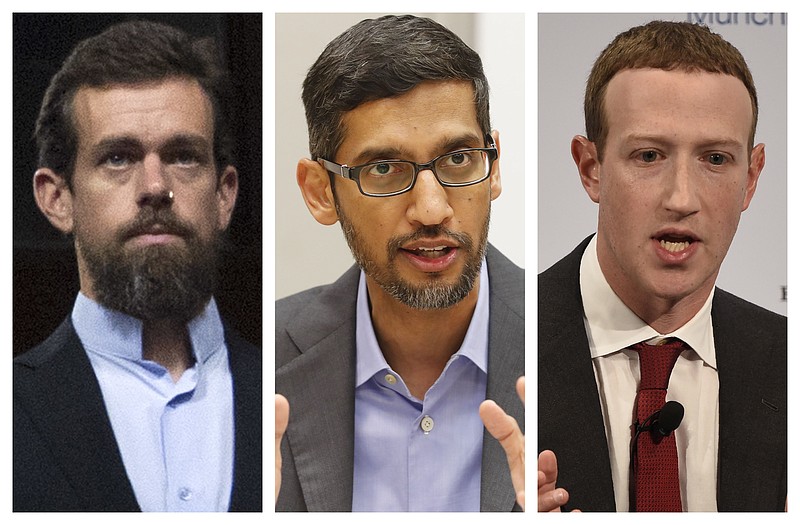The big political headline last week: US Rep. Liz Cheney lost her leadership position in Congress.
But there were no political winners from this. Not her replacement, Rep. Elise Stefanik. Not Donald Trump. Not Republicans. Not Democrats.
Yes, there was a winner.
But it wasn't us.
Currently, we are living through the greatest con in human history. The evidence is everywhere: discord, extremism, rage, alienation, disinformation, chaos, distrust, confusion and tribalism. What's true? What isn't? We can't agree on basic science. Or basic election results. These are Tower of Babel times in America.
It's like some invisible force is manipulating us without our knowledge.
Yes, that's exactly what it's like.
In the last 20 years, one industry has risen above all others to become ubiquitous, an everywhere part of everyday life.
Tech and social media companies.
They're the winners.
"We run everything," said Jaron Lanier, a Silicon Valley pioneer, in New York Magazine. "We've disrupted absolutely everything."
These companies, among the richest in human history, derive their wealth in one way.
Capturing our attention.
And manipulating our behavior.
Not by providing and prioritizing fact-checked, well-sourced news.
Not by offering an abundance of spiritual content that frees your heart.
Instead, they exploit our vulnerabilities, insecurities and deep-seated fears. They use a business model of dopamine-pseudo-entertainment-alarmism with an inherent design - keep people scrolling, searching, posting - that propagates disinformation as truth, cultivates fear and paranoia, normalizes tribalism and rage while turning fake news real and real news fake.
"A business model that preys on human attention means that we are worth more as human beings and citizens of this country when we are addicted, outraged, polarized and narcissistic," testified Tristan Harris before a recent Congressional hearing.
Harris, once at Google, now leads the Center for Humane Technology; he warns that all crises are secondary to this.
"This is breaking many of the nation's fundamental life organs," he testified.
Look at Cheney. She lost her job because she told the truth about the 2020 election.
But what is true?
And what is a lie?
"Imagine a world where no one believes anything true. Everyone believes the government's lying to them. Everything is a conspiracy theory. 'I shouldn't trust anyone. I hate the other side.' That's where all this is heading," Harris says in the Netflix film "The Social Dilemma."
Remember: social media companies make money the longer we scroll, shop, Tweet, post, Like and Dislike, download and stare. Advertisers pay for what algorithms deliver:
Our attention captured.
Our behavior manipulated.
Suggested videos lead us down a Hansel and Gretel trail of rabbit holes and conspiracy theories. (Facebook admits that some 64% of extremists joined online groups because algorithms directed them.)
An MIT study found that fake news is retweeted 70 percent more frequently than accurate news.
Our brains are wired for negative bias. Our phones don't absorb us through grace and stillness, but fear and insecurity. Our phones promise connection - for which we long - yet such connection is often jittery, empty and destructive.
Teenagers report high levels of self-harm, loneliness and depression. Their phones are often the last thing they see at night and the first thing they grab in the morning.
"My phone is like a drug," said one.
"An addiction," said another.
Yes, we can use our phones for good, but algorithms are not interested in goodness. Their model is singular:
"Facebook is a fundamentally addictive product that is designed to capture as much of your attention as possible without any regard for the consequences," former Facebook operations manager Sandy Parakilas told New York Magazine.
Look around. QAnon. Cancel culture. Jan. 6. Vaccines aren't trusted. Cell-towers cause COVID-19. Across the world, democracies are in recession. In the U.S., Trump, often using Twitter, made more than 30,000 false or misleading claims, the Washington Post states. Here and abroad, there's talk of civil war.
"It's plain as day," says Tim Kendall, former Facebook and Pinterest executive, in the film. "These services are killing people and causing people to kill themselves."
The struggle is not Republicans against Democrats, left versus right.
It is the freedom of our own minds against out-of-sight computer systems.
"As humans, we've almost lost control over these systems," Parakilas says in the film. "Because they're controlling the information that we see, they're controlling us more than we're controlling them."
David Cook writes a Sunday column and can be reached at dcook@timesfreepress.com.

